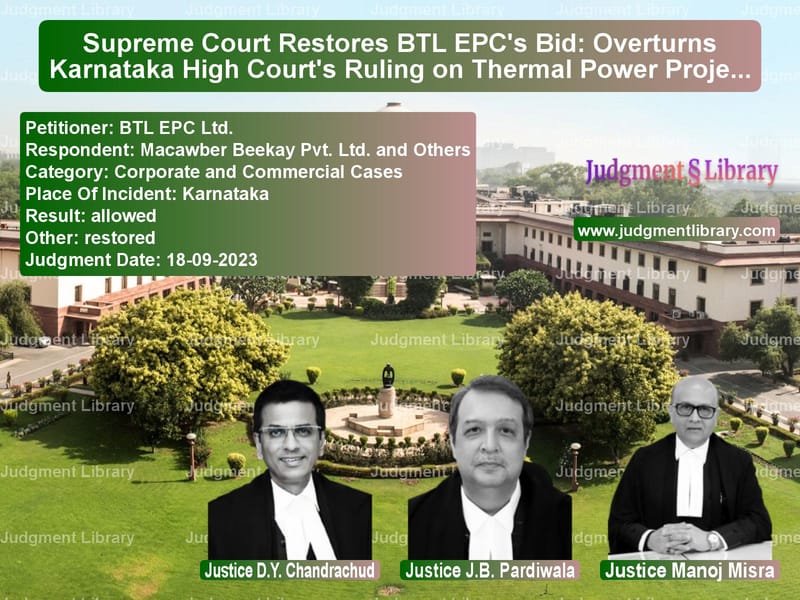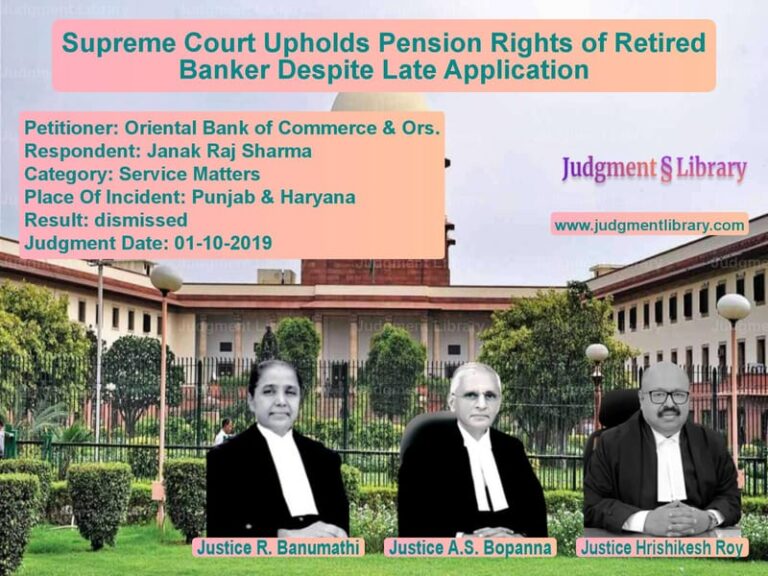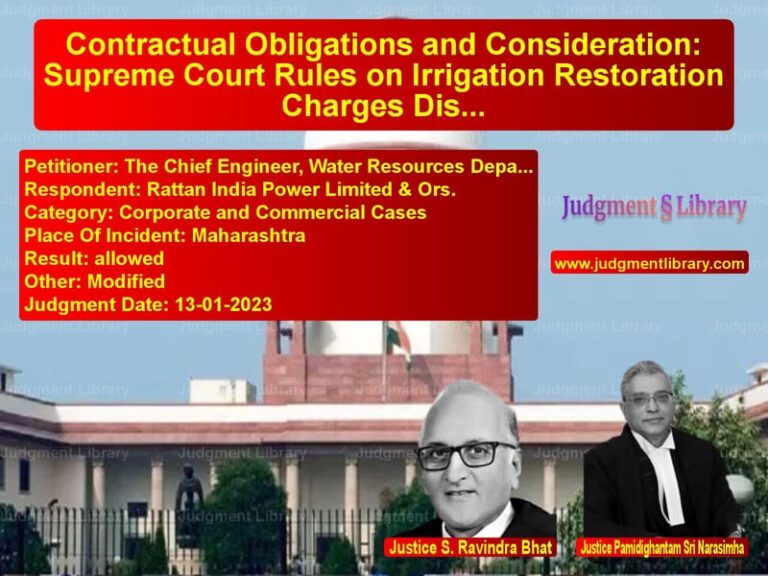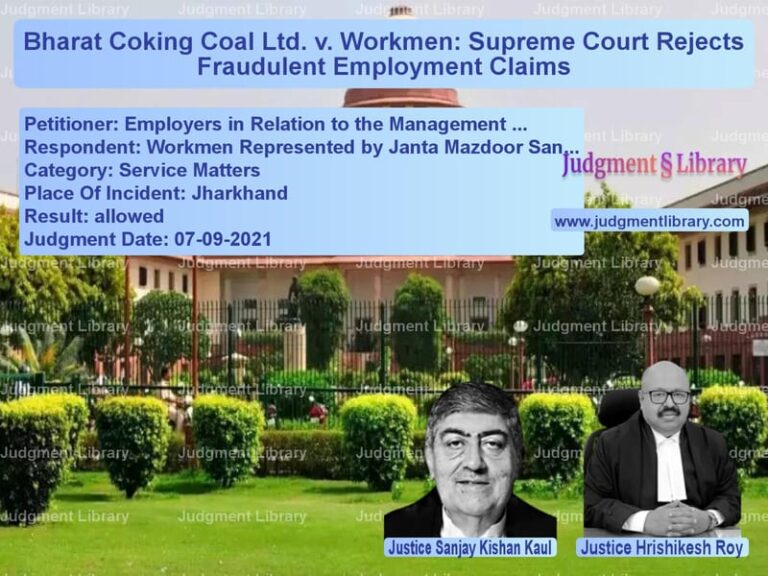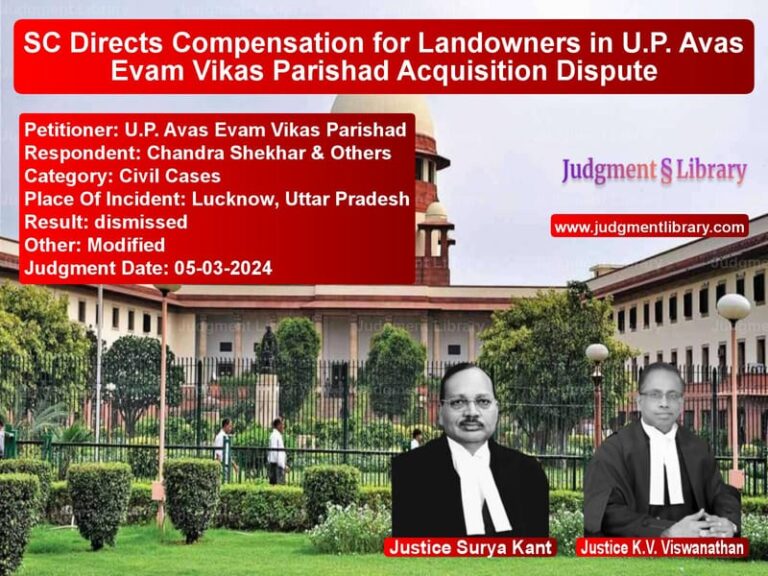Supreme Court Restores BTL EPC’s Bid: Overturns Karnataka High Court’s Ruling on Thermal Power Project Contract
The Supreme Court of India has ruled in favor of BTL EPC Ltd., setting aside a Karnataka High Court decision that had quashed the Letter of Intent (LoI) awarded to the company for the Ash Handling Plant of the 5×800 MW Yadadri Thermal Power Station. The ruling underscores the principle that courts should exercise caution when interfering in complex technical contract matters and respect the discretion of the tendering authority.
Background of the Case
The case arose from a contract awarded by Bharat Heavy Electricals Limited (BHEL) for the construction of an Ash Handling Plant at the Yadadri Thermal Power Station. The contract, worth ₹378.64 crore, was granted to BTL EPC Ltd. through a tender process. However, Macawber Beekay Pvt. Ltd. challenged the award, arguing that BTL EPC’s bid violated the Public Procurement Order, 2020, as it involved a Chinese collaborator.
The Karnataka High Court’s Division Bench had ruled against BTL EPC Ltd., holding that its collaboration with Fujian Longking Company Limited (a Chinese firm) rendered it ineligible under procurement rules, thereby directing BHEL to consider Macawber Beekay’s bid instead.
Legal Issues Considered
The Supreme Court examined the following key legal questions:
- Did BTL EPC Ltd. violate the Public Procurement Order, 2020 by collaborating with a Chinese company?
- Was the Karnataka High Court justified in interfering with BHEL’s discretion in awarding the contract?
- What was the role of the Chinese company in the bid, and did it amount to a consortium under procurement rules?
- Had the project progressed to a stage where judicial interference would cause delays and financial losses?
Petitioner’s Arguments (BTL EPC Ltd.)
The appellant, represented by Mukul Rohatgi, Gaurab Banerjee, and V. Giri, argued:
- The collaboration with Fujian Longking was limited to design support and did not constitute a joint bid or a formal consortium under Clause 7.2 of the tender documents.
- The bid was submitted and awarded to BTL EPC Ltd. as a standalone entity, and the Chinese company had no equity stake or control over the project.
- The Office Memorandum dated February 8, 2021, issued by the Government of India, clarified that restrictions on bidders from countries sharing a land border with India applied only to full-fledged partners and not to subcontractors providing specialized services.
- BHEL had exercised its discretion in assessing compliance, and the Karnataka High Court wrongly substituted its own judgment over that of the tendering authority.
- A significant portion of the project (about 80%) was already completed, and canceling the contract at this stage would result in financial losses and delays.
Respondents’ Arguments (Macawber Beekay Pvt. Ltd.)
The respondents, represented by Harish Salve and Neeraj Kishan Kaul, contended:
- BTL EPC Ltd. did not meet the technical criteria under Clause 01.01.01 of the tender, and it relied on Fujian Longking to qualify, effectively forming a bidding consortium.
- As per the Public Procurement Order, 2020, companies with foreign participation from countries sharing a land border with India must be registered with the competent authority, which Fujian Longking was not.
- The Chinese company had undertaken design, engineering, and quality support, making it a crucial part of the project, thereby violating procurement regulations.
- The Karnataka High Court rightly held that the contract should be reconsidered, as Macawber Beekay had met all technical and financial requirements.
Supreme Court’s Observations
A bench comprising Chief Justice D.Y. Chandrachud, Justice J.B. Pardiwala, and Justice Manoj Misra examined the arguments and ruled in favor of BTL EPC Ltd. Key observations included:
1. Collaboration with Fujian Longking Did Not Constitute a Consortium
The Court held that BTL EPC Ltd.’s agreement with Fujian Longking was not a full-fledged consortium but a service contract:
“The Chinese company was not an equity partner and had no share in the profits. It merely provided design support, which does not qualify as a joint bidding arrangement requiring registration.”
2. No Violation of Public Procurement Order, 2020
The Court noted that the government’s clarification on February 8, 2021, excluded subcontracted service providers from the registration requirement:
“The Public Procurement Order requires registration only for full-fledged bidders. BTL EPC Ltd. bid independently and was awarded the contract as a standalone entity.”
3. Karnataka High Court Wrongly Interfered in BHEL’s Discretion
The Supreme Court criticized the Karnataka High Court’s ruling for overstepping judicial limits:
“Tendering authorities have technical expertise to assess compliance, and courts should not substitute their judgment unless there is arbitrariness or mala fide intent.”
4. Substantial Completion of the Project
The Court took note of the 80% completion of the project and the financial implications of cancellation:
“At this advanced stage, directing a fresh bidding process would disrupt power supply infrastructure and result in significant financial losses.”
Final Verdict
The Supreme Court ruled:
- The Karnataka High Court’s order was set aside.
- The Letter of Intent (LoI) issued to BTL EPC Ltd. was restored.
- The contract awarded by BHEL was upheld, allowing BTL EPC Ltd. to continue work.
- No costs were imposed on either party.
Implications of the Judgment
The ruling has far-reaching consequences for public procurement and contract law:
- Prevents Unnecessary Court Interference: Reaffirms that courts should defer to technical expertise in commercial tenders.
- Clarifies Public Procurement Rules: Distinguishes between full-fledged bidders and service collaborators, ensuring fair competition.
- Protects Infrastructure Projects: Ensures that ongoing projects are not derailed due to legal disputes, safeguarding public investment.
- Sets a Precedent for Future Bids: Establishes a framework for assessing compliance with procurement policies.
Conclusion
The Supreme Court’s decision in BTL EPC Ltd. vs. Macawber Beekay Pvt. Ltd. upholds fair competition while ensuring that judicial intervention does not disrupt major infrastructure projects. By restoring BTL EPC Ltd.’s contract, the ruling emphasizes the importance of procedural fairness and respect for tendering authorities’ discretion.
Petitioner Name: BTL EPC Ltd..Respondent Name: Macawber Beekay Pvt. Ltd. and Others.Judgment By: Justice D.Y. Chandrachud, Justice J.B. Pardiwala, Justice Manoj Misra.Place Of Incident: Karnataka.Judgment Date: 18-09-2023.
Don’t miss out on the full details! Download the complete judgment in PDF format below and gain valuable insights instantly!
Download Judgment: btl-epc-ltd.-vs-macawber-beekay-pvt.-supreme-court-of-india-judgment-dated-18-09-2023.pdf
Directly Download Judgment: Directly download this Judgment
See all petitions in Company Law
See all petitions in Corporate Compliance
See all petitions in unfair trade practices
See all petitions in Judgment by Dhananjaya Y Chandrachud
See all petitions in Judgment by J.B. Pardiwala
See all petitions in Judgment by Manoj Misra
See all petitions in allowed
See all petitions in Restored
See all petitions in supreme court of India judgments September 2023
See all petitions in 2023 judgments
See all posts in Corporate and Commercial Cases Category
See all allowed petitions in Corporate and Commercial Cases Category
See all Dismissed petitions in Corporate and Commercial Cases Category
See all partially allowed petitions in Corporate and Commercial Cases Category

